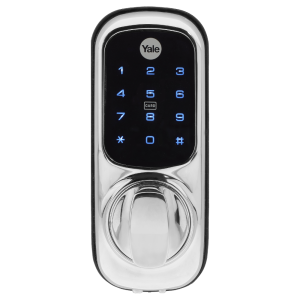Keyless entry systems - convenience meets security
Every home and every business needs to find the best way to protect people, property and assets and this requires a thorough assessment of your needs, the inherent risks of your location and circumstances and what your budget is. Keyless entry systems have increasingly become a convenient and cost-effective solution for homes and businesses looking for a suitable way to manage security and enjoy supplementary benefits.
What is a keyless entry system?
Traditionally, homes and businesses have relied on a manual key to unlock doors and access properties. Of course this has worked successfully for many years, but managing a physical item which can be lost, stolen or copied does have its drawbacks. So keyless systems have been developed which, as the name suggests, don’t require a key but still offer adequate security.
Although 21st century access control systems such as smart locks and biometric locks don’t require a key, the term ‘keyless entry systems’ more accurately refers to a locking mechanism that is activated by a keypad, a card, a fob or by voice or video activation. So using a keypad a user would input a unique PIN or code to gain entry. The Yale Keyless Lock supplied by MB Direct is a good example of this. Or using a card or fob a digital signal is sent to the lock to activate it. With voice or video activation a user can press a button and speak to, or show their face to, someone inside the building who will activate the lock and enable access. A home or business can choose the system that works best for them and provides the most convenience and practicality.
What are the benefits of keyless systems?
- No physical key – There is no physical key which can be lost, stolen or copied. Although a card or fob is a physical object, it can’t be copied if stolen.
- Easy to install – The technology is in the locking mechanism, so this just needs mounting and setting up.
- Monitoring – It is possible to monitor who comes in and out of a home or business, and with a keypad system you can issue individual codes so that you can track who is arriving/leaving and when.
- Guest access – You can grant temporary access to people with a ‘guest’ code that only works for a certain period of time, so this would be useful if someone is feeding a pet while you are on holiday, or if a contractor is working on the house while you are at work. For a business this has numerous potential uses for visitors, contractors and VIPs.
- 24/7 access – Using a keyless system there is always a means of entry, so you don’t need to leave keys out or hide them if someone has forgotten theirs, and you don’t need to distribute keys to people working overtime on a weekend etc.
- Professional – A keyless entry system is a good indicator of a business with solid systems and processes and presents a good impression for visitors.
- Flexible – Keyless entry systems can be used on both external doors and internal doors, ie. where security is required between departments or annexe buildings within a business.
- Maintain security – It is easy for the user to maintain security if there is a breach, by changing the PIN or code required and revoking access by removing cards or fobs.
- Remote management – Where access is required, the user can share a PIN or code remotely, so if a friend or family member turns up unexpectedly and you are not in, you can grant them access until you get home. Likewise, if a trusted person needs access to the business outside of normal working hours.
- Security – A keyless system simply activates the same security system using a keyless method, as would be used for a traditional key. This is usually a type of deadbolt, and so in terms of physical security, there is no difference in how robust your security system is.
Things to consider when looking at keyless entry systems
So there are various benefits to keyless entry systems, but there are also some drawbacks which you would need to consider if you were thinking about installing a keyless entry system. In most cases these are issues which can easily be overcome:
- Remember – A user needs to remember a code or PIN in order to gain entry, and also needs to remember a card or fob. Most people attach these to car keys or something they always take to work. Ultimately, it is a robust system that people will get used to, although for security reasons you should periodically change the code or PIN.
- Wear and tear – On some keyless systems the buttons on a keypad can get worn, so it would be easy for someone to guess a code or PIN. You can bypass this by regularly changing the code/PIN or by issuing individual codes/PINs so all the buttons are used and it’s harder to guess.
- Power – Most keyless systems are battery-powered, so it is possible to lose power and the system is disabled. You should retain a physical back-up key to avoid problems, and most systems have a battery indicator to warn you of when this might occur, so you can preventively act to avoid losing power.
- Cost – Keyless systems are a little more expensive than a traditional key mechanism, because there is more technology involved, but the better quality systems, and the additional benefits and functionality they offer, are worth the investment and a cheaper version would not be as reliable.
Check out the range of keypads and keyless entry systems offered by MB Direct and buy online today.